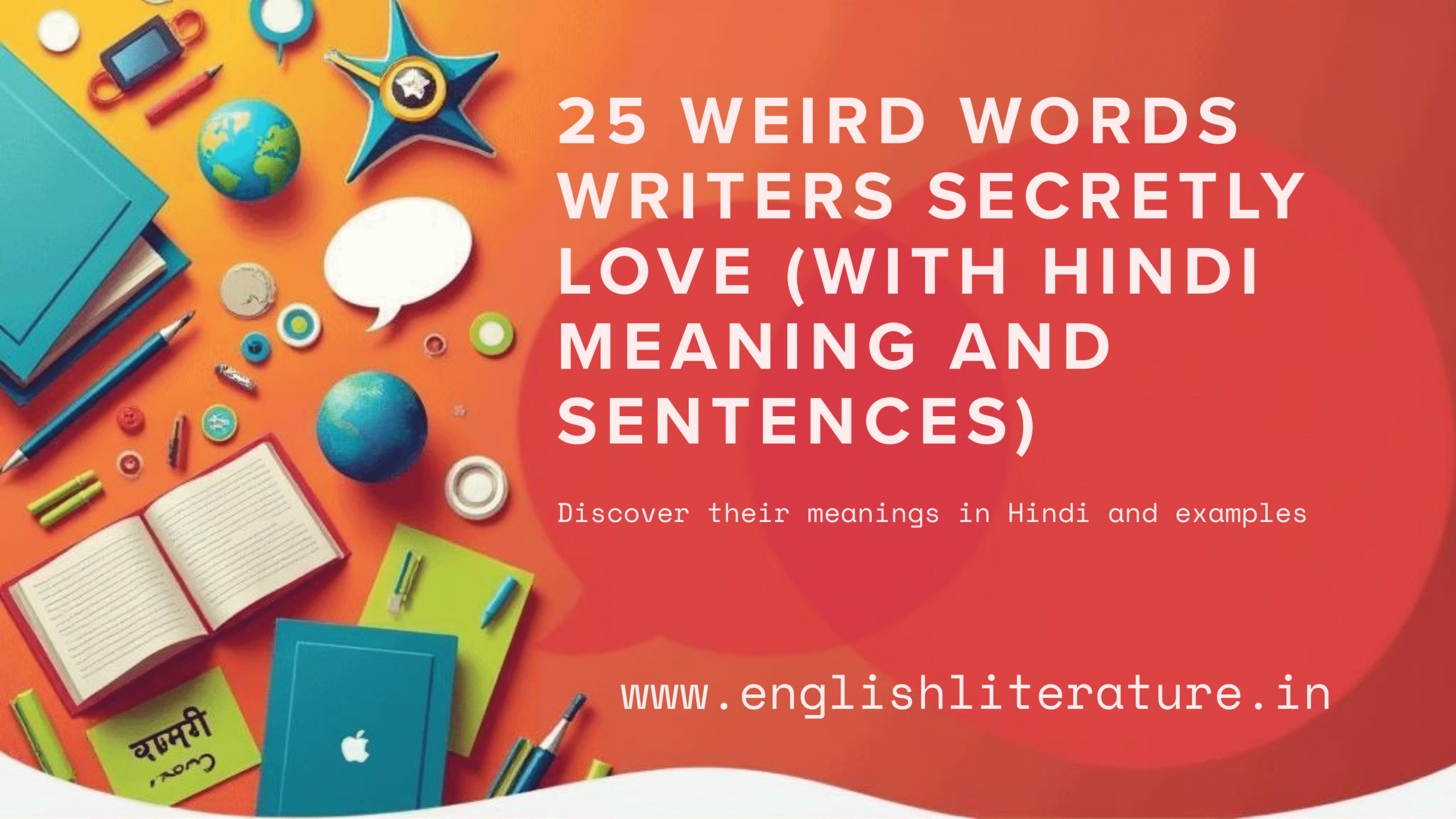25 Weird Words Writers Secretly Love (With Hindi Meaning and Sentences)
Language has always been more than a tool of communication; it is an art form. Writers often search for words that do not merely describe but evoke emotions, paint vivid images, and reveal subtle nuances of thought. In English literature, some words fall outside daily use yet hold extraordinary power. These “weird words” carry history, cultural layers, and a sense of playfulness that writers secretly adore.
In the Romantic period, Samuel Taylor Coleridge described poetry as “the best words in the best order.” Similarly, Shakespeare delighted in coining unusual terms like zany and swagger, which were once considered strange but are now part of common speech. Today, exploring rare and curious words not only enriches our vocabulary but also enhances our understanding of literary techniques such as symbolism, imagery, and diction.
Below is a carefully curated list of 25 weird words writers secretly love—each explained with its Hindi meaning and example sentences to aid students, educators, and literature enthusiasts.
1. Defenestration
Meaning (अर्थ): Throwing someone or something out of a window.
Sentence: He joked about the defenestration of his broken laptop.
(उसने मजाक में अपने टूटे लैपटॉप को खिड़की से बाहर फेंकने की बात कही।)
2. Susurrus
Meaning (अर्थ): A soft whispering or rustling sound.
Sentence: The susurrus of the sea waves was soothing.
(समुद्र की लहरों की सरसराहट सुकून देने वाली थी।)
3. Limerence
Meaning (अर्थ): Intense, dreamy infatuation with someone.
Sentence: His limerence for her distracted him from studies.
(उसका उसके प्रति आकर्षण उसे पढ़ाई से भटका रहा था।)
4. Petrichor
Meaning (अर्थ): The earthy scent after fresh rainfall.
Sentence: I love the petrichor after the first rain.
(मुझे पहली बारिश के बाद मिट्टी की खुशबू बहुत पसंद है।)
5. Gobsmacked
Meaning (अर्थ): Completely shocked or amazed.
Sentence: She was gobsmacked when she saw the surprise party.
(सरप्राइज पार्टी देखकर वह हैरान रह गई।)
6. Kerfuffle
Meaning (अर्थ): A small, noisy fuss or disturbance.
Sentence: There was a kerfuffle over the missing tickets.
(गुम हुए टिकटों को लेकर हलचल मच गई।)
7. Agelast
Meaning (अर्थ): Someone who never laughs.
Sentence: He is such an agelast, always serious and strict.
(वह इतना गंभीर है कि कभी हंसता ही नहीं।)
8. Snollygoster
Meaning (अर्थ): A cunning, dishonest person, often in politics.
Sentence: Many voters believed the candidate was just a snollygoster.
(कई मतदाताओं ने माना कि उम्मीदवार केवल एक चालाक नेता है।)
9. Quixotic
Meaning (अर्थ): Unrealistically idealistic or dreamy.
Sentence: His quixotic plan was impossible to achieve.
(उसकी अव्यवहारिक योजना पूरी करना नामुमकिन था।)
10. Callipygian
Meaning (अर्थ): Having shapely, attractive buttocks.
Sentence: The statue was famous for its callipygian beauty.
(वह मूर्ति अपने आकर्षक आकार के लिए मशहूर थी।)
11. Nudiustertian
Meaning (अर्थ): Referring to the day before yesterday.
Sentence: We met at the park on the nudiustertian evening.
(हम परसों शाम पार्क में मिले थे।)
12. Ulotrichous
Meaning (अर्थ): Having tightly curled or woolly hair.
Sentence: The boy’s ulotrichous hair looked stylish.
(लड़के के घुंघराले बाल बहुत स्टाइलिश लग रहे थे।)
13. Zugzwang
Meaning (अर्थ): A no-win situation where any move makes things worse.
Sentence: In chess, he was in zugzwang and had no safe move.
(शतरंज में वह ऐसी स्थिति में था कि कोई भी चाल सुरक्षित नहीं थी।)
14. Absquatulate
Meaning (अर्थ): To run off or escape quickly.
Sentence: The thief absquatulated before the police arrived.
(पुलिस आने से पहले चोर भाग गया।)
15. Cattywampus
Meaning (अर्थ): Crooked, tilted, or out of order.
Sentence: The picture on the wall looked cattywampus.
(दीवार पर लगी तस्वीर टेढ़ी लग रही थी।)
16. Cacophony
Meaning (अर्थ): A loud, jarring mix of sounds.
Sentence: The cacophony of horns irritated everyone.
(हॉर्न की कर्कश आवाज़ ने सबको परेशान कर दिया।)
17. Flummoxed
Meaning (अर्थ): Completely puzzled or confused.
Sentence: She was flummoxed by the tricky question.
(वह पेचीदा सवाल से उलझन में पड़ गई।)
18. Widdershins
Meaning (अर्थ): Moving counterclockwise or against the norm.
Sentence: The children ran widdershins around the bonfire.
(बच्चे अलाव के चारों ओर उल्टी दिशा में दौड़ रहे थे।)
19. Bumbershoot
Meaning (अर्थ): A whimsical term for an umbrella.
Sentence: Don’t forget your bumbershoot, it may rain.
(अपनी छतरी मत भूलना, बारिश हो सकती है।)
20. Eructation
Meaning (अर्थ): The act of burping.
Sentence: His loud eructation embarrassed him at dinner.
(डिनर पर उसकी तेज डकार से वह शर्मिंदा हो गया।)
21. Tittynope
Meaning (अर्थ): A small leftover bit of food or drink.
Sentence: She left only a tittynope of juice in the glass.
(उसने गिलास में थोड़ी सी जूस छोड़ दी।)
22. Psithurism
Meaning (अर्थ): The soft sound of wind through leaves.
Sentence: The psithurism made the night peaceful.
(पत्तों की सरसराहट ने रात को शांत बना दिया।)
23. Runcible
Meaning (अर्थ): A playful, made-up word (often a strange spoon).
Sentence: He ate his dessert with a runcible spoon.
(उसने अपनी मिठाई एक अजीब से चम्मच से खाई।)
24. Skedaddle
Meaning (अर्थ): To dash away in a hurry.
Sentence: The kids skedaddled when the teacher entered.
(जैसे ही शिक्षक आए बच्चे जल्दी से भाग गए।)
25. Gobbledygook
Meaning (अर्थ): Nonsense or overly complex language.
Sentence: The legal document was full of gobbledygook.
(कानूनी दस्तावेज़ बेतुकी भाषा से भरे हुए थे।)
Conclusion
Uncommon words open new doors for imagination. For students of literature, they provide an opportunity to analyze how language evolves and how authors experiment with diction. Writers from Lewis Carroll to James Joyce have used odd or invented words to symbolize chaos, humor, or even the subconscious mind. Expanding vocabulary with such rare terms is not about memorization but about appreciating language as an art form.
As George Orwell noted in Politics and the English Language, clarity should be central to writing, yet unusual words can sometimes illuminate truths that plain words cannot.
FAQ: 25 Weird Words Writers Secretly Love
Q1. Why do writers use strange or rare words?
A: Writers use them to add depth, symbolism, and creativity to their texts.
Q2. Are these words still in modern usage?
A: Some like petrichor and gobbledygook are popular, while others are used mainly in literature or academic circles.
Q3. Who are some authors known for inventing words?
A: Shakespeare, Lewis Carroll, and James Joyce often created new words.
Q4. How can students use these words in essays?
A: Sparingly—use them to highlight literary analysis or enrich creative writing.
Q5. What is the most poetic word from the list?
A: Many consider susurrus or psithurism the most lyrical.
Q6. Which word is used in politics?
A: Snollygoster refers to a cunning and dishonest politician.
Q7. Can weird words become mainstream?
A: Yes, many words once considered unusual, like zany, are now everyday vocabulary.
Q8. How do these words help in literary studies?
A: They improve character analysis, help identify stylistic choices, and expand critical vocabulary.

